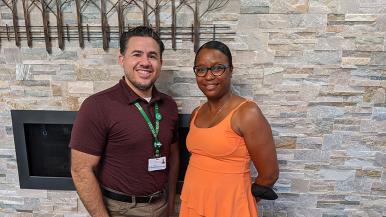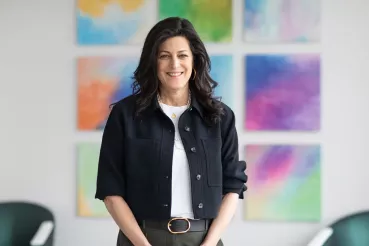When test results showed that Kristina Lubic had breast cancer, even her doctor could not believe it. But a retest confirmed the results. She was only 31 and had a 3-year-old.
At the time, Kristina’s husband didn’t know anyone who had survived cancer. To help them both get through this time, he decided they would throw a big party when she finished chemotherapy treatments, and they focused on that. And so, just six weeks after her last treatment, they threw a party.
“My friends needed to see that I was OK,” Kristina recalls. “My cousin even flew in from out of state for the party.”
Celebrating survivorship
That was six years ago. The Lubics have thrown a party every year since. They provide all the food and drinks and even rent a bounce house for the children.
This year, they held a 50/50 raffle as well and donated the proceeds to Waterford Place Cancer Resource Center. Selling tickets during the party for $1 each, they raised $446.
“I surround myself with really cool people,” she says. “They all asked, ‘What can we do?’ and they all supported the 50/50.” The winner even donated her winnings to Waterford Place.
A wonderful support system
Kristina had a great support system to help her through treatment. Friends went with her to chemo treatments, sat with her and drove her home. When she was sick on the days following treatment, her son spent the weekend with his grandparents. Her hairdresser, a friend since she was 12, made wigs for her as a gift. Her company paid her salary the whole time she was going through treatment.
“In that way,” she says, “cancer was wonderful.”
Realizing how lucky she was to have that support, Kristina is moved to help other people going through cancer. She plans to hold the raffle every year moving forward.
Advocating for awareness
As a woman of color and because she had cancer at such a young age, Kristina now advocates for more awareness of breast cancer. Statistics show that incidence rates of breast cancer in women younger than 40 are higher in Black women than in white women. Additionally, Black women are more likely to die from breast cancer at every age. So, she encourages her family, friends and others to do their regular exams and to trust their instincts. She was the one who found her lump six years ago and pushed for her doctor to remove it and do the biopsy.
“I lecture the younger generation in my family to make them test for breast cancer early, to get mammograms and self-test,” she says. “Sometimes you need someone you know to go through it to realize it could happen to you.”




